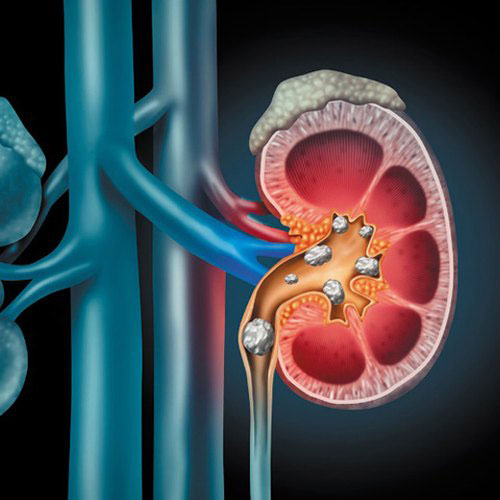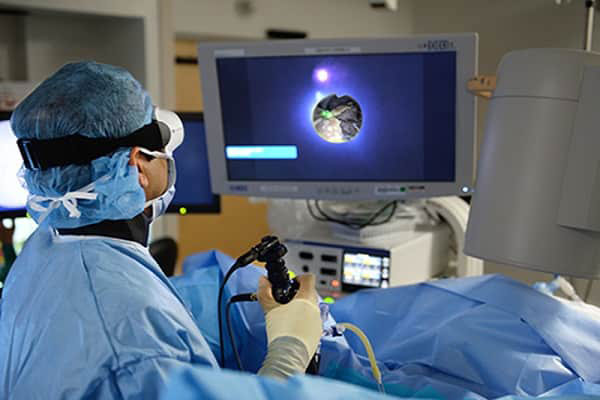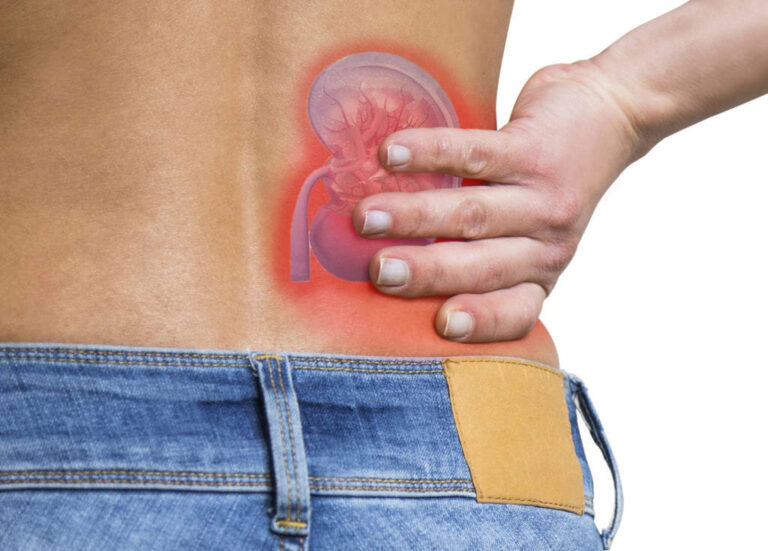WHAT ARE KIDNEY STONES?
Kidney stones or renal calculi, are a kind of crystal formed within the kidneys. Kidney stones develop from calcium, oxalate and uric acid deposition. They can grow throughout your urinary tract, including:
- Kidney
- Ureters
- Bladder
- Urethra
They’re a most common urinary tract disease affecting around 12% of the world’s population.

WHAT CAUSES THE FORMATION OF KIDNEY STONES?
The cause of kidney stones is bio-mineralization, which is a biochemical mechanism involving physicochemical changes and urine supersaturation.
A supersaturated solution contains dissolved chemicals exceeding the solvent’s ability to dissolve it under normal conditions resulting in crystal formation.
Kidney stones production is interfered by some chemicals that slow down the start of supersaturation, nucleation, crystal development, aggregation rate, and other stone forming processes. Urine includes substances that inhibit the development of crystals. Sometimes, these inhibitors do not function well for everyone thus causing stones. Inhibitors act by interacting with the crystal or by affecting the urine environment.
Kidney stones develop due to chemicals that cause imbalance between urinary stone inhibitors and promoters.
SYMPTOMS OF KIDNEY STONES
The location of the stone is correlated to the symptoms, the most common symptoms consist of:
- Renal colic – causing intense cramping pain
- Flank pain – Causing pain in the backside
- Hematuria – causing bloody urine with red, pink, or brown color
- Obstructive uropathy – urinary tract disease
- Urinary tract infections
- Blockage of urine flow
- Hydronephrosis – causing dilation of the kidney
Other common symptoms are:
- fever with chills
- nausea and vomiting
These are due to the intense pain of the stone incident. Sometimes, symptoms do not occur in cases like Initial stone formation or small kidney stones. You might not even feel any pain when small stones pass from the urinary tract.

TESTING AND DIAGNOSING
Various tests recommended by doctors are:
- Blood tests done to detect calcium, phosphorus, uric acid, and electrolytes
- Blood urea nitrogen (BUN) and creatinine to measure kidney function
- Urinalysis checks for crystals, bacteria, blood, and white cells
- Examination of stones to determine their type
- Abdominal X-rays
- Intravenous pyelogram (IVP)
- Retrograde pyelogram
- Ultrasound of the kidney
- MRI scan of the abdomen and kidneys
- Abdominal CT scan
The contrast dye used in CT scans and the IVP can affect kidney function but it causes no effect if you have normal renal function.
TYPES OF KIDNEY STONES
Knowing the type of kidney stone helps in treatment and prevent them from reoccurring. Kidney stones are of different size, shape, and chemical compositions. They are classified into five types:
Calcium stones – These are the most common type of kidney stones formed from calcium oxalate or calcium phosphate. They are narrow, plate-like, and take a dub-bell form when twined, when observed in urine sediments.
Struvite stones – These are made from Magnesium Ammonium Phosphate. These are the infection stones. It is formed in individuals with urease-producing chronic urinary tract infections. They might be quite big, even obstructing the urinary tract. Women are more prone than males to develop these stone.
Uric Acid stones – This is formed from Urate. Purine-rich diets, those including animal protein such as meat and fish, cause acidic urine that exacerbates the development of uric acid stones. Additionally, gouty arthritis patients or those undergoing chemotherapy may develop these kidney stones. Men are more likely than women to have this sort of kidney stone.
Cystine stones – It affects both men and women who suffer from Cystinuria, a genetic disorder. These kidney stones occur naturally in the body caused by amino acid (cysteine) which escapes from the kidneys into the urine in this form of stone.
Drug-induced stones – It is caused by medications like guaifenesin, triamterene, atazanavir, and sulfa drugs. People using the protease inhibitor like indinavir sulfate, a medicine used to treat HIV infection, are at high risk of kidney stones.
HOW CAN YOU PREVENT IT?
Prevention of kidney stone formation is better than its cure. Passing of the kidney stone is very painful. Treating the cause of kidney stone formation is effective in its prevention. Some of the ways to prevent kidney stone formation are:
Say yes to water – You should increase water consumption to maintain a urine output of at least 2 liters per day. Drinking more water or liquids is an important lifestyle modification that can help you avoid kidney stones. High water intake lowers urine saturation and dilutes promoters.
Calcium is the way to go – Calcium is found in most kidney stones. Consuming enough calcium in your diet can help prevent them from forming.
A little less Sodium – A diet with high sodium increases the risk of stone formation. This decreases renal tubular calcium reabsorption and increase in urine calcium.
Fruits and vegetables instead of meat – Animal protein has high acid content. This is due to high sulfur-containing amino acid composition. Reducing animal protein helps your urine to be less acidic. It is recommended to reduce meat, fish, and poultry, and vitamin D-rich foods in diet. Increased consumption of potassium-rich fruits and vegetables is important.
Less Vitamin C – It is linked to stone formation due to ascorbic acid being converted to oxalate in vivo.
IF IT HAPPENED, HOW CAN IT BE TREATED?
Drinking a lot of water is the most natural remedy to increase the chances of the stone passing through the urinary tract.
The kidney stones treatment varies according to the type of stone. Treatment would also depend on the size of stone. Medications and other therapies would dissolve the stone or break it. But if it is too large, or blocking the flow of urine, or causing infection, it is removed with surgery.
Some treatment options include:
- Medication: Some medications prescribed by doctor are:
-
- Allopurinol (Zyloprim) for uric acid stones
- Thiazide diuretics to prevent calcium stones
- Sodium bicarbonate/ sodium citrate to make the urine less acidic
- Phosphorus solutions to prevent calcium stones
- Ibuprofen (Advil), Acetaminophen (Tylenol) or Naproxen sodium (Aleve) to relieve pain
- Antibiotics to treat infection
-
- Lithotripsy: This is a non-invasive procedure involving sound waves to break large stones so they can pass easily through the ureters and into your bladder. It might cause bruising and bleeding in the abdomen, back, around the kidneys, and other surrounding organs.
- Tunnel surgery (percutaneous nephrolithotomy): The kidney stones are removed through a small incision made in the back. This procedure may be required when:
- The stone is obstructing the flow of urine
- The stone is causing infection or damaging the kidneys
- The stone has become too huge to pass
- The pain is unbearable
- Ureteroscopy: Your doctor might use a ureteroscope to remove the stone if it is stuck in the ureter or bladder. Ureteroscope contains a camera attached to a tiny cable put into the urethra and passed into the bladder. The doctor then snags the stone and removes it with a small cage. The stone is sent to a lab for examination. Urolithiasis is common across the world, regardless of significant advances in the development of novel treatments for kidney stones. Many elements of the development of kidney stones are yet unknown. In this case, what can be done on your part is mainly preventative by finding a balanced diet.
If you or anyone you know is suffering from kidney stones, our expert providers at Specialty Care Clinics will take care of your health and help you recover.
Call us on (469) 545-9983 to book an appointment with our specialists.

